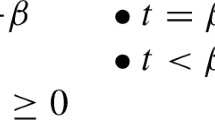Abstract
The AGM success postulates for belief expansions and revisions have been widely criticized. This has resulted in the development of a number of non-prioritized belief change theories that violate these postulates. It is shown that we must also discard the monotony postulate for belief expansions if we abandon the success postulates. Non-prioritized belief change theories should instead fulfill a weaker postulate, which we call Conditional Monotony.
Similar content being viewed by others
Notes
In this paper, I use the term “information” to denote any propositional input that is offered to the epistemic subject regardless of whether the subject decides to incorporate it or not. In contrast to that, any previously received information that has actually been incorporated is called a “belief” of the subject. The difference between these two terms was obscured in an earlier draft of this paper. I thank an anonymous reviewer for drawing my attention to this point as well as for some other helpful comments.
A case in point is, for instance, Hansson’s (1999) revision procedure that involves two steps: (1) A non-closing expansion by the new information and (2) consolidation to reestablish consistency. Although this procedure prevents inconsistent new information from being incorporated in some cases, Hansson’s procedure still satisfies the success postulate for consistent new information. Cf. Sec. 3.12.
See Hansson (1999, p. 238).
I have adapted this example for the present context from BonJour (1985).
References
Alchourrón, C. E., Gärdenfors, P., & Makinson, D. (1985). On the logic of theory change: partial meet contraction and revision functions. Journal of Symbolic Logic, 50, 510–530.
BonJour, L. (1985). The structure of empirical knowledge. Cambridge: Mass.: Harvard Univ. Pr.
Brewka, G. (1991). Belief revision in a framework for default reasoning. In A. Fuhrmann & M. Morreau (Eds.), Proceedings of the workshop: the logic of theory change (pp. 206–222). Konstanz: Springer.
Cross, C. B., & Thomason, R. H. (1992). Conditionals and knowledge-base update. In P. Gärdenfors (Ed.), Belief revision (pp. 247–275). Cambridge: Cambridge Univ. Pr.
Dalal, M. (1988). Investigations into a theory of knowledge base revision: preliminary report. In T. M. Mitchell & R. G. Smith (Eds.), Proceedings of the Seventh National Conference on Artificial Intelligence (AAAI-88) (pp. 475–479). St. Paul: AAAI Pr.
Falappa, M. A., Kern-Isberner, G., Reis, M. D. L., & Simari, G. R. (2012). Prioritized and non-prioritized multiple change on belief bases. Journal of Philosophical Logic, 41, 77–113.
Fermé, E. L., & Hansson, S. O. (1999). Selective revision. Studia Logica, 63(3), 331–342.
Gallier, J. R. (1992). Autonomous belief revision and communication. In P. Gärdenfors (Ed.), Belief revision (pp. 220–246). Cambridge: Cambridge Univ. Pr.
Gärdenfors, P. (1988). Knowledge in flux: modeling the dynamics of epistemic states. Cambridge: Mass.: MIT Pr.
Haas, G. (1999). Überzeugungen, Revision und Rechtfertigung. In J. Mittelstraß (Ed.), Proceedings of the Deutscher Kongreß für Philosophie XVIII: Die Zukunft des Wissens (pp. 45–50). Konstanz: Konstanz Univ. Pr.
Haas, G. (2005). Revision und Rechtfertigung: Eine Theorie der Theorieänderung. Heidelberg: Synchron.
Hansson, S. O. (1997a). Semi-revision. Journal of Applied Non-Classical Logic, 7(1–2), 151–175.
Hansson, S. O. (1997b). Special issue on non-prioritized belief revision. Theoria, 63(1–2), 1–134.
Hansson, S. O. (1999). A textbook of belief dynamics: theory change and database updating. Dordrecht: Kluwer.
Levi, I. (1991). The fixation of belief and its undoing. Cambridge: Cambridge Univ. Pr.
Author information
Authors and Affiliations
Corresponding author
Rights and permissions
About this article
Cite this article
Haas, G. A Brief Remark on Non-prioritized Belief Change and the Monotony Postulate. Acta Anal 31, 319–322 (2016). https://doi.org/10.1007/s12136-015-0281-9
Received:
Accepted:
Published:
Issue Date:
DOI: https://doi.org/10.1007/s12136-015-0281-9



